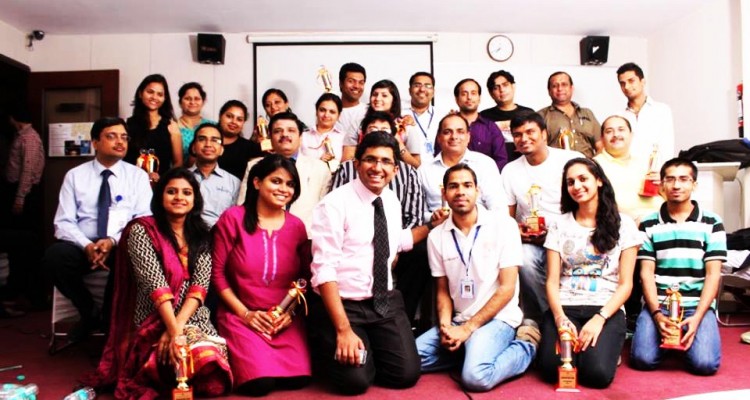 Dr Ritesh Malik is an Indian doctor, entrepreneur and investor. He runs a virtual Startup Accelerator in India, currently investing in and mentoring 11 startups across various industries.
Dr Ritesh Malik is an Indian doctor, entrepreneur and investor. He runs a virtual Startup Accelerator in India, currently investing in and mentoring 11 startups across various industries.
He was the first investor & mentor of FIN ROBOTICS, which became the first Indian hardware product company to raise a Series A venture funding. In 2015 Ritesh plans to launch his latest funding venture, ‘Project Guerrilla’, his vision for a premiere India based accelerator & incubation centre.
Hi Ritesh. Great to meet you. Let’s start by exploring a bit about yourself and your background.
I am a medical graduate from Dr. MGR Medical University Tamil Nadu. I did my MBBS from a rural medical college, Theni, and my internship from Ganga Ram Hospital in Delhi. My parents are doctors; my father is a paediatrician & mother is a gynecologist. We have a secondary healthcare hospital in Delhi called Radix Healthcare. I also studied for a short time at the London School of Economics and completed a semester at Harvard University.
Thanks. So what are you currently involved in?
I am heading up a startup accelerator wherein we help startups from the areas of healthcare, technology, education & energy to create valuable solutions, extensive research modules & market their products globally. I started my entrepreneurial journey in 2012 with an augmented reality startup called Adstuck, which created a product called Alive App. This was eventually bought out by Bennet & Coleman. In 2013 we started angel funding & mentoring startups. It has been a year since then and we have funded 11 startups.
In the first quarter of 2015 we are launching a new fund & a mentorship board for startups. I started with a single man team & now have over 40 entrepreneurs on our board who support us.
Can you tell me more about how you started this accelerator? How did you build your team?
As of now we don’t have a physical accelerator, we virtually incubate the companies, fund & mentor them. But, by the turn of 2015, we plan to launch a physical incubation centre as well.
In the virtual incubation we have a very young & passionate team. Our corporate finance is taken care by Nash Capital Partners. We believe in getting the best professional partners on board, so that we can focus on our core area that is startup strategy & mentorship. We have industry experts on board who guide us through strategy & guidance of their respective areas.
How does the business model work?
We acquire a minor stake in an idea, or an NPA (non performing asset). We turn around the company through our management knowledge, work hard with the founders, instill motivation & take the company to the next level.
After this, we have an option either to exit the company or expand the business.



You mentioned that you invest in startups across various industries including healthcare, technology, education and energy. How do you go about choosing which startups to invest in?
Choosing is easy. We don’t have a matrix to determine in which startup to invest. It’s a personal call. I have to be passionate about the product, irrespective of its market. In India software is a very easy startup investment and reaps larger returns as well when compared to the hardware sector. But we have 50% of our investments in the hardware side, simply because I am passionate about them. My passion drives the company & keeps me motivated to get the best product in hand.
What were the biggest challenges you faced in getting this set up?
The biggest challenge for me was to leave the medical field and focus on this project 24/7. But, apart from that, because I am passionate about this, I never found it very difficult.
What are the big risks associated with running an accelerator?
It can be a bleeding business. There is no recovery for at least 2-3 years. The valuations are on papers, which mean nothing until you have a sizeable exit. Accelerators have a typical period of 2-3 years to get the first major return. Until then you have to make sure you have sufficient funds to run the show.
Could you tell me a bit more about the new fund you have planned for 2015?
We plan to launch a Category I venture fund, wherein we can take investments from domestic and international investors. We would be looking at an investment size of one million USD for 2015.
So why did you choose to get involved in startups?
Startups are exciting. They give you a kick & are dynamic. Every single second things keep on changing, and above all the returns on startups’ successes can be great. Out of the list of Forbes 500 richest people only 2-3 are doctors. The issue with being a medical doctor is the lack of huge customer base.
Out of all your current projects what excites you the most right now?
All of them are very exciting, but Asimov Robotics is one of the most robust technology companies in Asia. I am excited to see the implementation of robotics in day-to-day lives of humans & in the field of medicine. We have made a couple of service robots and are now working on the brain machine interface & NLP (Natural Language Processing) of these robots to help them think like humans.
How can Asimov Robotics disrupt the healthcare industry in India?
Asimov Robotics is in talks with Dr. Devi Shetty, Chairman of Narayana Hrudalaya to come up with a medical based application of robotics. Most recently, NR is planning to launch its own medical education based platform wherein they can teach students on a robotic mannequin which can simulate medical emergencies and provide extensive training opportunities for students.
Which has been the most successful investment to date & why?
Fin Robotics has been the most successful investment for us. It has given us a return of 30X within 16 months of the investment.
Could you tell me more about the startup world in India?
India is a huge startup market. We have smart brains & decent resources. What we lack in India is angel funding. I believe funding is a bottleneck that every startup faces in India. But the scenario is changing; many entrepreneurs turned investors have started angel funds, to support the entrepreneurial ecosystem.
What are the biggest challenges you see facing healthcare in India?
Healthcare is the most unorganised sector in India. In spite of the fact that it is the second largest revenue shareholder of the world after agriculture, spending on healthcare by the government is limited.
Doctors in India do not pursue the entrepreneurial path, and I believe the system changes only when entrepreneurs take the initiative to change it. Innovation & implementation of new ideas is all it takes to subtly improvise the system. Also, the Indian healthcare system is deeply fragmented.
Many great engineers come from India, but the medical startups seem to come from USA- what needs to be done to address this brain drain and ignite the startup sector in India?
Entrepreneurship in India needs angel investment. The least funded area in seed capital is healthcare, because of the lack of understanding by people who create the technology. Doctors need to partner with these technology startups and help guide them with actual solutions and add value to the healthcare delivery process. Doctors should take a stake in early stage healthcare companies and mentor them and guide them to create world class products, thus in turn doctors can realise their entrepreneurial dream without quitting their jobs.
You left a life as a junior doctor to be an entrepreneur… How did you make that decision? Was it difficult?
No, it wasn’t difficult at all. I decided to be an entrepreneur while I was at the London School of Economics for a short course during my 2nd year of medical school. Though I did very well with my academics, I never liked the outpatient or the surgical departments. I used to love medical research. So I planned to focus on the entrepreneurial side of medicine and eventually everything turned out to be great. In 2013 I attended a short course at Harvard University & there Professor Cherian Thachenkary opened a whole new world of social innovations which led me to think about the developing nations as a larger economic market than the developed ones.
It is hard to change career path especially in India, wherein you have a lot of social pressure to not to think out of the box. But my family has been supportive.

Dr. Ritesh Malik & Jayakrishnan (CEO Asimov Robotics) with Dr. Shetty (Chairman Narayana Medical City)
What advice would you give for future ‘Doctorpreneurs’?
I would suggest doctors to think out of the box. Go digital & create products in the field of healthcare. The market is huge & the returns on investments are mindboggling. I believe that doctors have an extra edge that technocrats don’t, because they know the industry in depth.
Also, the next BIG thing in healthcare entrepreneurship will not be in the developed nations, it’ll be in the developing nations & rural areas of the world. The gap is massive & whoever will help patients to access quality information, prevent diseases & cure ailments will be the next man/woman in the Forbes 500 list.


